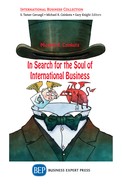How Psychic Distance Impacts Trade

The U.S. trade deficit is large. In 2016, it was more than $500 billion and it will remain high in the coming years. Policymakers should be deeply concerned about our country’s long-term economic health.
Two major approaches can improve the international trade position of the United States. The first is to reduce imports, and the second is to increase exports. U.S. customers appear, at least in the short run, unlikely to reduce their consumption from abroad. So one needs to find ways to increase exports.
Companies are said to develop the direction of their export thrust based on their “psychic distance” to other countries. This concept, as defined by researchers at the Uppsala School, consists of two dimensions: cultural and geographic factors. People and companies are considered to be more “culturally distant” when there are differences in customs, language, and economic development. People and companies are regarded as being “geographically distant” when they are further apart only by sheer mileage.
The theory of psychic distance has significant implications when applied to the export process. Exporting begins among people and companies that are less culturally and geographically distant. For example, Canadian companies present the opportunity for U.S. companies to work with a country that has both cultural similarities and geographic proximity. U.S. companies ultimately can transfer this experience by expanding into new markets that may be more psychically distant to the United States.
One could attempt to reduce the psychic distance between countries to enhance trade relations. For example, a U.S. business executive could visit a Latin American immigrant area in the United States to become more knowledgeable of their language and customs. A deeper cultural understanding could be beneficial for this U.S. business executive when trying to handle trade negotiations with Latin American executives. If cultural dimensions become more familiar among individuals, then the psychic distance is lessened through cultural understanding and trust.
To sum up the key issues:
• Selecting a country as an export customer is the combined choice between cultural and geographic dimensions.
• To encourage exporting, it helps to start with low-hanging fruits. For U.S. firms, this is a result of the combination of both cultural and geographic proximity. Canada or the United Kingdom could be major testing regions.
• Change happens! Over time, a region may reconstitute itself, which can impact trade relations. Immigration can trigger cultural change among countries, such as language facility, psychological expectation, or new demand.
The United States must recognize the role of psychic distance and its potential impact on improving the U.S. trade balance deficit and enhancing American’s economic competitiveness.
